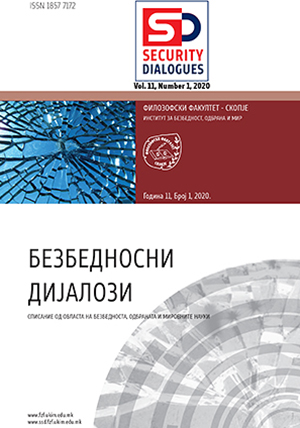
Submission guidelines |
Instructions for Authors: Authors submit papers electronically, in Microsoft Word
format, Times New Roman, font size 12, single-spaced. The papers should include: main title,
author(s)’ name and institutional affiliation, abstract (max. 300 words) and keywords (up to 5),
subheadings and reference literature. The research article’s length is 5000-8000 words, while
book reviews and commentaries may be up to 3000-5000 words.
Publication ethics: -Publication ethnics has been elaborated in the About the Journal entry more systematically, but here we point out a few additional aspects that should be taken into account by each author. In a case of co-authorship, every author listed on a journal article should have made a significant contribution to the work reported. This could be in terms of research conception or design, or acquisition of data, or the analysis and interpretation of data. As an author or co-author, you share responsibility and accountability for the content of your article. We do not welcome guest and ghost authorship. There is zero tolerance to plagiarism. Be careful to abide to the following rules: When citing others’ (or your own) previous work, ensure you have marked quoted text from another source with quotation marks; attribute and reference the source of the quotation clearly within the text and in the Reference section, obtain permission from the original publisher when using previously published figures or tables. Also self-plagiarism (i.e. redundant reuse of your own work, usually without proper citation) is not allowed. By submitting a manuscript to Security Dialogues you confirm that the text has not been submitted (or published) elsewhere. Any potential conflict of interest should be declared. When authors submit a manuscript they are responsible for disclosing all financial and personal relationships that might bias their work. To prevent ambiguity, authors must state explicitly whether potential conflicts do or do not exist. Authors should do so in the manuscript on a competing interest notification page that follows the title page, providing additional detail, if necessary, in a cover letter that accompanies the manuscript. In the event that the editor is made aware of any allegation of research misconduct, s/he shall deal with allegations appropriately and in accordance to the international standards in the field. The editor is willing to publish corrections, clarifications, retractions and apologies when needed. Deadlines for submission: 30 April and 31 September. Submission: The papers should be submitted to the following email addresses: Editor in Chief: Oliver Bakreski, oliver@fzf.ukim.edu.mk Deputy Editor: Sergej Cvetkovski, sergej@fzf.ukim.edu.mk Technical Secretary: Aleksandar Pavleski, pavleski@fzf.ukim.edu.mk |